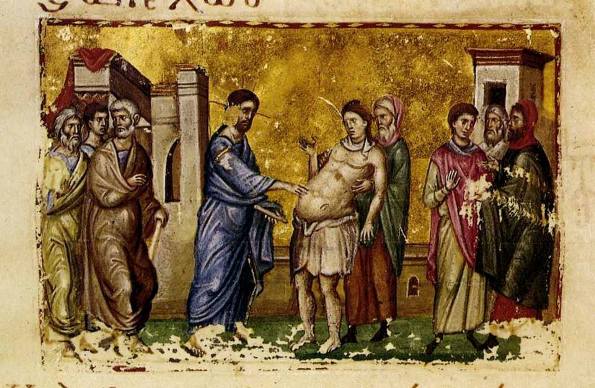DAILY MEDITATION: "Is it lawful to cure on the sabbath or not?"
Liturgical day: Friday of the Thirtieth Week in Ordinary Time
 Gospel text (Lk 14,1-6): On a sabbath Jesus went to dine at the home of one of the leading Pharisees, and the people there were observing him carefully. In front of him there was a man suffering from dropsy. Jesus spoke to the scholars of the law and Pharisees in reply, asking, “Is it lawful to cure on the sabbath or not?” But they kept silent; so he took the man and, after he had healed him, dismissed him. Then he said to them “Who among you, if your son or ox falls into a cistern, would not immediately pull him out on the sabbath day?” But they were unable to answer his question.
Gospel text (Lk 14,1-6): On a sabbath Jesus went to dine at the home of one of the leading Pharisees, and the people there were observing him carefully. In front of him there was a man suffering from dropsy. Jesus spoke to the scholars of the law and Pharisees in reply, asking, “Is it lawful to cure on the sabbath or not?” But they kept silent; so he took the man and, after he had healed him, dismissed him. Then he said to them “Who among you, if your son or ox falls into a cistern, would not immediately pull him out on the sabbath day?” But they were unable to answer his question.
"Is it lawful to cure on the sabbath or not?"
Fr. Antoni CAROL i Hostench
(Sant Cugat del Vallès, Barcelona, Spain)
Today, we will center our attention on the piercing question Jesus asked the Pharisees: “Is it lawful to cure on the sabbath or not?” (Lk 14, 4), and in their very significant silence, as per St. Luke: “But they kept silent” (Lk 14, 4).
Many are the Gospel episodes where Our Lord reproaches their hypocrisy to the Pharisees. It is quite noteworthy how God's outstanding interest in substantiating up to which point He dislikes this sin —false appearances, deceitful actions—, which is at the antipodes of Christ's praise to Nathaniel: “Here is a true Israelite. There is no duplicity in him” (Jn 1, 47). God loves the heart's simplicity, the spirit's naivety. On the other hand, He rejects with energy the intricacies, the shady looks, the double standards, the hypocrisy.
What is significant in the Lord's question and in the Pharisees' silent reply is the bad conscience they had, deep inside. There was a man suffering from dropsy who was looking forward to be healed by Jesus. The fulfillment of the Jewish Law —mere attention to the letter with contempt of the spirit— and the empty presumption of their blameless behavior, brings them to appear shocked by the attitude of Christ who, led by his merciful heart, does not allow any legal formalisms to prevent him from healing he who is ailing.
The Pharisees realize that their hypocrite behavior cannot be justified and this is what keeps them silent. A clear lesson shines through in this passage: the need to understand that saintliness is to follow Christ —until full love— and not to coldly fulfill some legal precepts. The Commandments are holy because they come all the way directly from God's infinite Wisdom, but it is quite possible to live them in a legalistic and empty way, and it is then when the incongruity appears of pretending to follow God and ending up by going after ourselves.
Let the charming simplicity of the Mother of God prevail in our lives.
Source: evangeli.net
